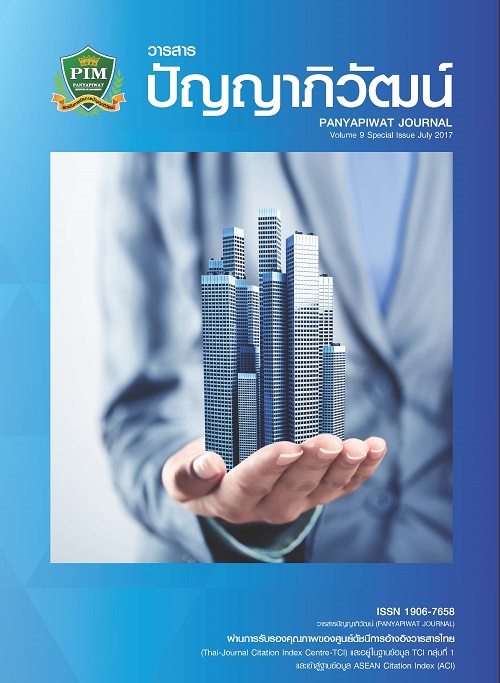เราจะช่วยให้ผู้เรียนภาษาอังกฤษชาวไทยเป็นผู้อ่านอย่างตื่นตัวได้อย่างไร
Main Article Content
บทคัดย่อ
ผู้เรียนภาษาที่สองจะมีความสามารถถึงขั้นเก่งได้ก็ด้วยการที่ได้สัมผัสกับภาษาเป้าหมายนั้นอย่างมากและบ่อยครั้ง การได้สัมผัสกับภาษาเป้าหมายมีสองรูปแบบ ได้แก่ การได้ฟังและการได้อ่าน ในบริบทของผู้เรียนภาษาอังกฤษชาวไทยที่เรียนภาษาอังกฤษในฐานะภาษาต่างประเทศ การได้สัมผัสกับภาษาอังกฤษด้วยการอ่านมีมากกว่าการได้ฟัง และการอ่านมากๆ ด้วยความเข้าใจในตัวบททำให้เกิดการสังเกตและเรียนรู้คำศัพท์ ซึ่งเป็นหัวใจสำคัญของการเกิดความสามารถทางภาษา อย่างไรก็ตาม การมีความสามารถทางภาษาโดยการรู้คำศัพท์อย่างดีนั้น ผู้อ่านต้องมีความรู้ในเรื่องกลวิธีการอ่านและสามารถใช้กลวิธีนั้นได้อย่างดี และในบรรดากลวิธีการอ่านที่งานวิจัยด้านการอ่านภาษาที่สองชี้ตรงกันว่ามีประสิทธิภาพ การตั้งคำถามโดยการให้ผู้เรียนตั้งเอง เป็นกลวิธีที่ดีมากอย่างหนึ่ง เป็นสิ่งที่ทำให้ผู้เรียนเป็นผู้อ่านที่ตื่นตัว ซึ่งสำคัญมากต่อสมิทธิภาพการเรียนของพวกเขา เป็นเครื่องมือการสอนที่ได้รับความนิยมมาอย่างยาวนานทั่วโลก การช่วยผู้อ่านให้มีความตื่นตัวในสิ่งที่อ่าน คือ ข้อดีที่โดดเด่นของการตั้งคำถาม ดังนั้นในบทความนี้จึงเสนอแนะให้ผู้เรียนภาษาอังกฤษชาวไทยได้รับการสอนกลวิธีการตั้งคำถามนี้เพื่อสร้างพวกเขาให้เป็นผู้อ่านที่มีความตื่นตัว
Second language (L2) learners can achieve proficient language use through much and frequent exposure to the target language. Exposure is available in two forms: listening and reading. In the context of Thai learners of English, English is mostly learned as a foreign language (EFL) rather than a second language (ESL). Exposure to English, therefore, occurs in the form of reading more frequently than in the form of listening. A great extent of reading which is surely with comprehension is conducive to noticing and acquiring vocabulary which is central to language competence. However, to acquire comprehension and good vocabulary, the readers must know some effective reading strategies and be able to use them in their reading effectively. Of available effective reading strategies well documented in L2 reading research, generating questions by learners on the reading material is recognized as one of the most effective reading strategies, and it is this question generating strategy that has been an outstanding teaching tool most widely and often used by instructors around the globe. One benefit of student-generated questions (SGQ) is that it enables the students to become active readers. Hence, the SGQ is strongly recommended in this paper as one effective reading strategy to help Thai EFL learners to become active readers.
Article Details
“ข้าพเจ้าและผู้เขียนร่วม (ถ้ามี) ขอรับรองว่า บทความที่เสนอมานี้ยังไม่เคยได้รับการตีพิมพ์และไม่ได้อยู่ระหว่างกระบวนการพิจารณาลงตีพิมพ์ในวารสารหรือแหล่งเผยแพร่อื่นใด ข้าพเจ้าและผู้เขียนร่วมยอมรับหลักเกณฑ์การพิจารณาต้นฉบับ ทั้งยินยอมให้กองบรรณาธิการมีสิทธิ์พิจารณาและตรวจแก้ต้นฉบับได้ตามที่เห็นสมควร พร้อมนี้ขอมอบลิขสิทธิ์บทความที่ได้รับการตีพิมพ์ให้แก่สถาบันการจัดการปัญญาภิวัฒน์หากมีการฟ้องร้องเรื่องการละเมิดลิขสิทธิ์เกี่ยวกับภาพ กราฟ ข้อความส่วนใดส่วนหนึ่งและ/หรือข้อคิดเห็นที่ปรากฏในบทความข้าพเจ้าและผู้เขียนร่วมยินยอมรับผิดชอบแต่เพียงฝ่ายเดียว”
เอกสารอ้างอิง
Baleghizadeh, S. (2013). Peer interaction through student-made questions: does it facilitate reading comprehension?. The Language Learning Journal, 41(1), 104-144.
Calfee, R. C. & Drum, P. A. (1986). Research on teaching reading. In M. Wittrock (Ed.). Handbook of research on teaching. (pp. 804-849). New York: Macmillan.
Dorkchandra, D. (2013). The effects of question generating strategy instruction on EFL freshmen’s reading comprehension and use of English tenses. Journal of Liberal Arts, Prince of Songkla University, Hat Yai Campus, 5(2), 32-45.
Harvey, S. & Goudvis, A. (2000). Questioning: The strategy that propels readers forward. In Strategies that work: Teaching comprehension for understanding and engagement. (pp. 81-94). York, ME: Stenhouse.
Humphries, J. (2013). Beyond Who, What, Where, When, Why, and How: Preparing students to generate questions in the age of common core standards. Journal of Research in Childhood Education, 29, 551-564.
Hussain, N. (2003). Helping EFL/ESL Students by Asking Quality Questions. The Internet TESL Journal, 9(10), available at http://iteslj.org/Techniques/Hussain-Questions.html
King, A. (1994). Autonomy and question asking: The role of personal control in guided student-generated questioning. Learning and Individual Differences, 6, 163-185.
Look, S. M. (2011). Question Generation. Hawaii: Pacific Resources for Education and Learning.
McVeigh, J. & Bixby, J. (2011). Q Skills for success: Reading and Writing 2. Hong Kong: Oxford University Press.
National Reading Panel. (2000). Teaching children to read: An evidence-based assessment of the scientific research literature on reading and its implications for reading instruction. Washington, DC: National Institute of Child Health and Human Development.
Palinscar, A. S. & Brown, A. L. (1984). Reciprocal teaching of comprehension-fostering and comprehension-monitoring activities. Cognition & Instruction, 1(2), 117-175.
Pressley, M. (2006). The master teacher series: Reading comprehension. Sanford, CA: Teaching Doctors.
Snow, C. E. & Sweet, A. P. (2003). Reading for comprehension. In A. P. Sweet & C. E. Snow (Eds.). Rethinking reading comprehension. (pp.1-11). New York: Guilford Press.
Stanovich, K. E. (2000). Progress in understanding reading: Scientific foundations and new frontiers. New York: Guilford.
Taboada, A. & Guthrie, J. T. (2006). Contributions of student questioning and prior knowledge to construction of knowledge from reading information text. Journal of Literacy Research, 38(1), 1-35.
Therrien, W. J. & Hughes, C. (2008). Comparison of repeated reading and question generation on students’ reading fluency and comprehension. Learning Disabilities: A Contemporary Journal, 6(1), 1-16.
Whitaker, S. F. (1983). Comprehension questions: about face!. ELT Journal, 37(4), 329-334.
Wong, B. (1985). Self-questioning instructional research: A review. Review of Educational Research, 55, 227-268.
Yu, F. Y. & Liu, Y. H. (2005). Potential values of incorporating multiple-choice question-construction for physics experimentation instruction. International Journal of Science Education, 27(11), 1319-1335.
Yu, F. Y., Chang, Y. & Wu, H. (2015). The effects of an online student question-generation strategy on elementary school student English learning. Research and Practice in Technology Enhanced Learning, 10(24), 1-16.


